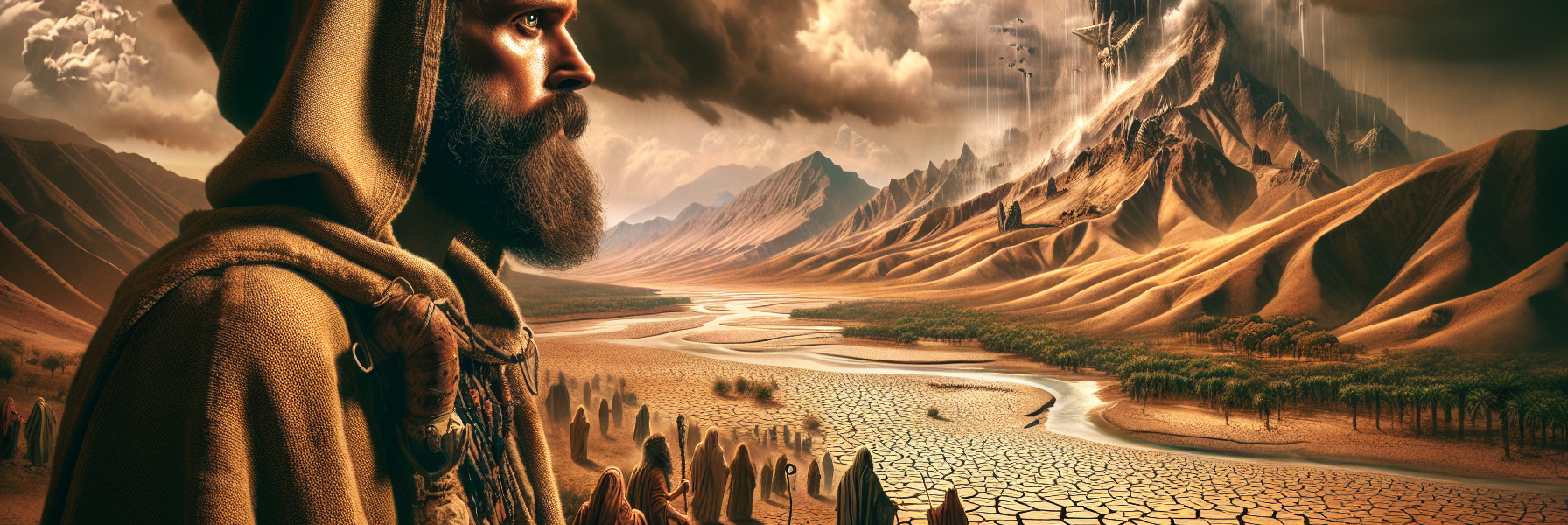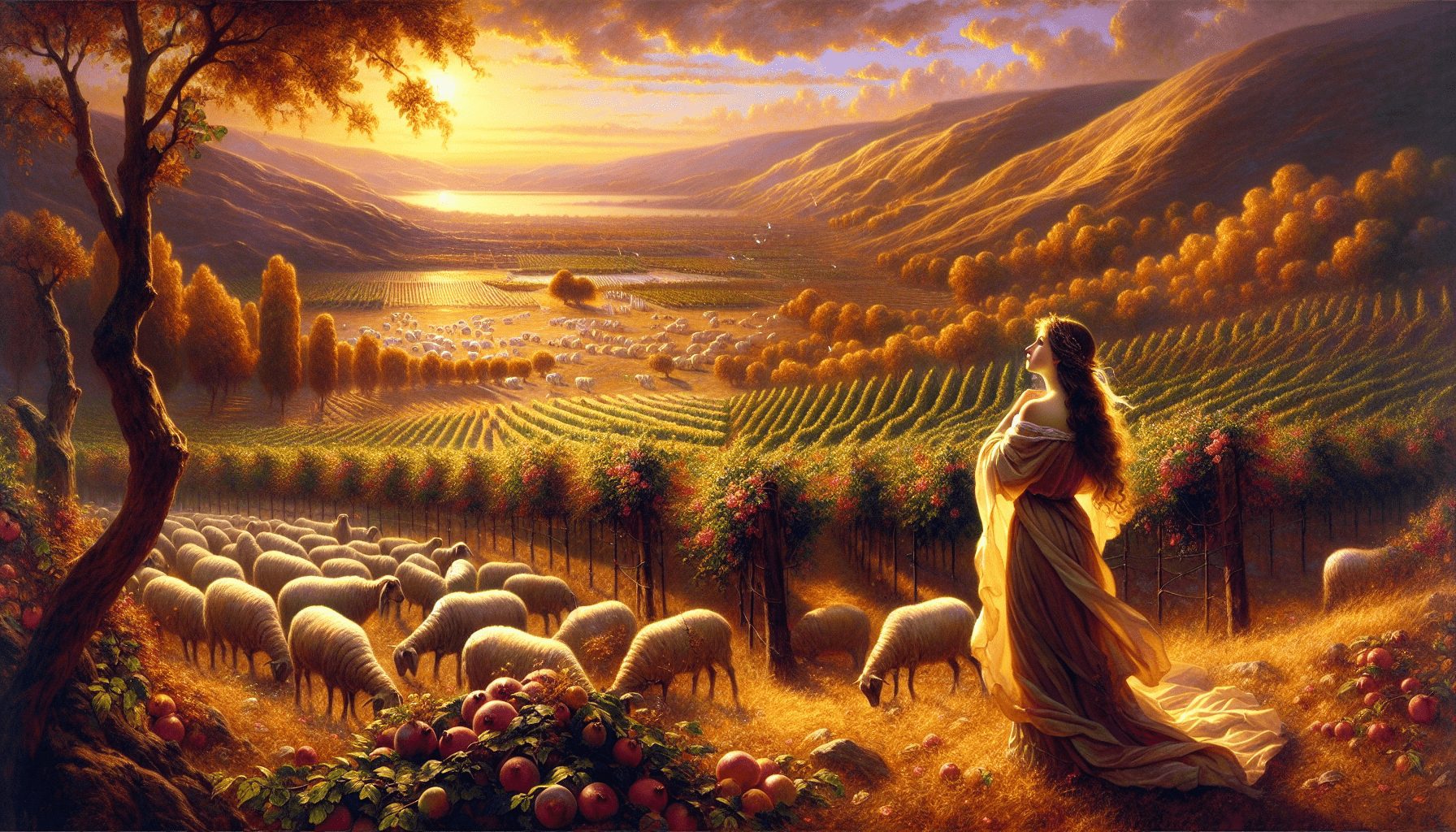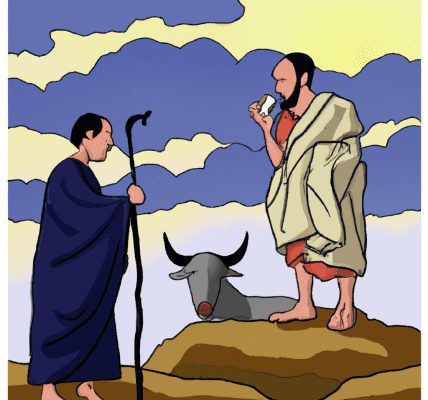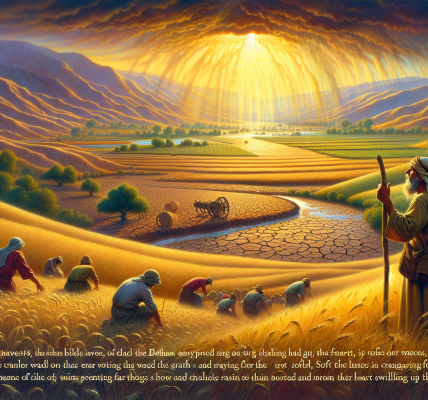**The Showdown on Mount Carmel**
The land of Israel lay parched and desolate, its cracked earth crying out for rain. For three long years, not a drop had fallen from the heavens. The once-green hills had turned to dust, the rivers to dry riverbeds, and the people to desperation. King Ahab, weak and swayed by his wicked wife Jezebel, had led the nation into the worship of Baal, the storm god of the Phoenicians. But Baal was silent, his idols lifeless, and the famine only deepened.
Then the word of the Lord came to Elijah the Tishbite, the prophet who had declared the drought: *”Go, present yourself to Ahab, and I will send rain upon the earth.”*
Elijah, a man of rugged faith and unyielding conviction, obeyed. His cloak was coarse, his beard wild, and his eyes burned with the fire of Yahweh’s presence. He sought out Obadiah, a faithful servant of the Lord who had hidden a hundred prophets in caves from Jezebel’s murderous rage.
“Go, tell your master that Elijah is here,” the prophet commanded.
Obadiah trembled. “My lord, if I tell Ahab and the Spirit of the Lord carries you away, the king will kill me!”
But Elijah reassured him. “As the Lord lives, I will surely show myself to Ahab today.”
When Ahab saw Elijah, his face twisted in anger. “Is it you, you troubler of Israel?”
Elijah stood firm. “I have not troubled Israel, but you and your father’s house have, by forsaking the commandments of the Lord and following the Baals.” Then, with divine authority, he issued a challenge: *”Now summon all Israel to meet me at Mount Carmel, along with the four hundred and fifty prophets of Baal and the four hundred prophets of Asherah who eat at Jezebel’s table.”*
Ahab, though reluctant, complied. The people of Israel, desperate and divided, gathered on the slopes of Carmel. The mountain rose majestically, its heights a fitting stage for the confrontation between the living God and the silent idols.
Elijah stepped forward, his voice ringing across the crowd. *”How long will you waver between two opinions? If the Lord is God, follow Him. But if Baal is god, follow him!”*
The people stood silent, their hearts torn.
Then Elijah laid out the terms of the test. Two bulls would be prepared for sacrifice—one for the prophets of Baal, one for him. But no fire would be lit. *”You call on the name of your god, and I will call on the name of the Lord. The God who answers by fire—He is God.”*
The people shouted in agreement. “It is a good plan!”
The prophets of Baal went first. They chose their bull, prepared it on the altar, and began their frenzied cries. “O Baal, answer us!” they shrieked, dancing around the altar. Morning turned to noon, and still there was no reply—only silence.
Elijah, watching, could not resist a taunt. *”Shout louder! Perhaps he is deep in thought, or busy, or traveling. Maybe he is sleeping and must be awakened!”*
The prophets screamed and slashed themselves with swords and spears, as was their custom, their blood mingling with the dust. They raved until the time of the evening sacrifice, but still—no fire, no voice, no answer.
Then Elijah called the people near. He took twelve stones, one for each tribe of Israel, and rebuilt the ruined altar of the Lord. He dug a trench around it, arranged the wood, and laid the sacrificed bull upon it. Then, to remove all doubt, he commanded that four large jars of water be poured over the offering—not once, not twice, but three times, until the trench was filled.
At the time of the evening sacrifice, Elijah lifted his hands to heaven and prayed: *”Lord, God of Abraham, Isaac, and Israel, let it be known today that You are God in Israel and that I am Your servant. Answer me, O Lord, answer me, so these people will know that You, Lord, are God, and that You are turning their hearts back again.”*
Then the fire of the Lord fell.
It consumed the burnt offering, the wood, the stones, the dust—and even licked up the water in the trench. The people fell on their faces, crying out, *”The Lord—He is God! The Lord—He is God!”*
Elijah, his face alight with holy triumph, commanded, *”Seize the prophets of Baal! Let not one escape!”* The people did as he said, and Elijah led them down to the Kishon Valley, where they were executed, purging the land of their deceit.
Then Elijah turned to Ahab. *”Go, eat and drink, for there is the sound of a heavy rain.”*
While Ahab feasted, Elijah climbed back to the summit of Carmel, bowed down, and prayed. He sent his servant to look toward the sea. Six times the servant returned, saying, “There is nothing.” But the seventh time, he came back breathless. “A cloud as small as a man’s hand is rising from the sea!”
Elijah sprang up. *”Go, tell Ahab to hitch up his chariot and go down before the rain stops him!”*
The heavens grew black with clouds, the wind roared, and the rains came in torrents, ending the long famine. Ahab rode furiously toward Jezreel, but the hand of the Lord was upon Elijah, who girded up his cloak and ran before the king’s chariot all the way to the city gates.
That day, Yahweh had proven Himself mighty. The false gods were exposed, the people’s hearts stirred, and the drought broken. Yet the battle was far from over—for Jezebel’s wrath still smoldered, and the struggle for Israel’s soul would rage on. But for now, the Lord had spoken—and fire had fallen from heaven.




